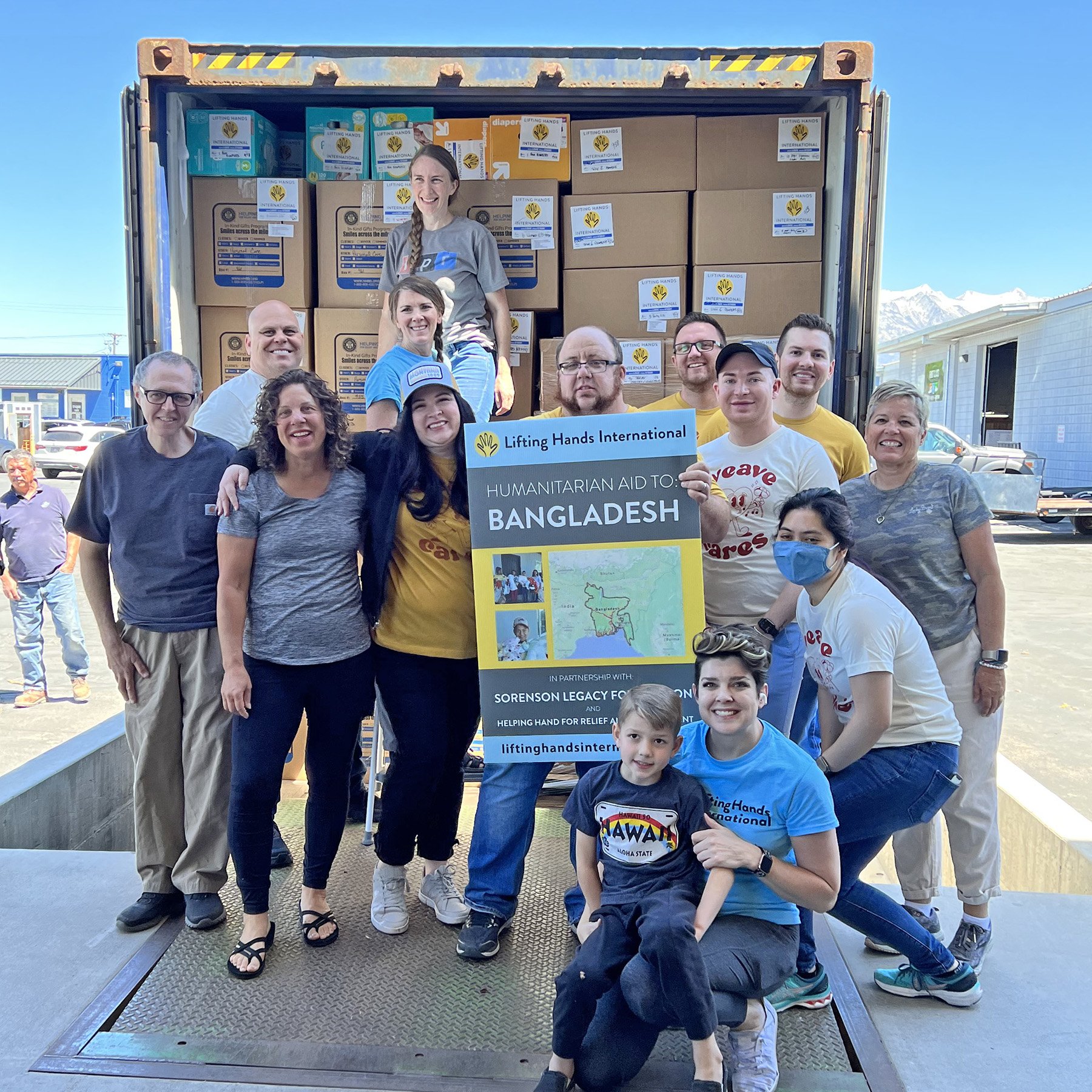Unprecedented changes in US policies are deeply affecting humanitarian organizations and the refugees they support. It can be hard to keep track of how budget cuts have impacted the humanitarian field, so we put together this guide to break everything down.
An LHI food distribution for Rohingya refugees in Bangladesh.
What do humanitarian aid organizations do for refugees?
Millions of people who have lost everything—their homes, livelihoods, belongings—depend on humanitarian aid organizations to survive and rebuild their lives. .
Humanitarians provide aid to help people who have been forced to flee their homes from violence, natural disasters, or instability. They distribute food, medicine, clean water, clothing, and other essentials. Humanitarian organizations also build and run important infrastructure like schools, hospitals, and shelters, as well as provide essential services for mental health, education, professional development, and resources to help generate income.
An LHI aid distribution for children in Afghanistan. We go the extra mile to include handmade stuffed animals, quilts, and “You Are Loved” cards.
Why does the US government provide funding to humanitarian aid?
Some humanitarian aid organizations receive funding from the US government. By doing so, the US advocates for human rights, promotes global stability, and supports the world’s most vulnerable people.
Providing humanitarian aid abroad helps prevent crises from getting worse, reduces the risk of widespread instability, and strengthens America’s relationships with other countries. It also addresses the root causes of forced migration, like violence and famine.
The US government also provides funding to organizations that help resettle newly arrived refugees. This ensures that refugees can successfully become part of American society by reducing their dependence on government assistance in the long run. Integrating refugees into their new communities also boosts local economies by strengthening the workforce and fueling economic growth.
We provide Ukrainian frontline hospitals with essential equipment.
Who is being affected by cuts to US humanitarian aid?
Millions of people depend on humanitarian aid to make it from one day to the next. Recent federal budget cuts in aid have already caused a sudden, devastating impact around the world.
Nearly $500 million worth of food is rotting at ports as refugees in Sudan, Bangladesh, and Ethiopia fight hunger and famine.
Medicines and antibiotics are expiring, instead of treating sick and elderly refugees in Myanmar.
Hospitals in Ukraine aren’t receiving the supplies needed to operate on injured civilians.
Clinics across Uganda and South Africa have shut down, leaving people without HIV medication and increasing the risk of infections.
People displaced by violence in the Democratic Republic of the Congo don’t have access to clean water.
What else has been suspended or cut?
The US Refugee Admissions Program (USRAP) has been suspended, shutting America’s doors to thousands of refugees—including those who were already approved for resettlement. Check out our article here for more information on the USRAP suspension, and what the resettlement process involves.
In addition to the USRAP suspension, funding has been cut off for NGOs that help refugees after they’ve relocated to the US. These NGOs act as a support system for new arrivals, and without them, many refugees in the US are lost with no one to turn to.
Anne, LHI Refugee Resettlement Manager, met Ivone the day after she resettled in Utah. With the support of organizations like LHI, Ivone’s family was able to integrate into their community. Now, Ivone has graduated from high school with honors and is going to college.
What’s happening to the refugees who have already resettled in the US?
Transitioning from a refugee camp to everyday life in the US can present a whole new set of challenges, which is why caseworkers are essential. Each newly arrived refugee family is assigned individual caseworkers to help them make sense of their new home. Caseworkers ensure children are enrolled in school, parents find jobs, and bills are paid. They guide families on how to get around their new neighborhood, access English classes, and book doctors’ appointments.
Recent funding cuts have forced many organizations to lay off their caseworkers. The remaining staff are overwhelmed and unable to meet the needs of struggling families. Newly resettled refugees have been left with no one to help as they navigate their new lives. Isolated and uncertain, they are left wondering if they are truly welcome here.
We’re powered by people like you!
How is LHI responding?
We’re making up for what has been lost. Our team has been working around the clock to expand our programs: maternal healthcare, shipping more international aid, providing goats to build self-sufficiency in refugee camps, and conducting wellness checks for isolated families—whatever refugees need, we’re there—ensuring that refugees aren’t forgotten.
How can you help?
Act today to ensure that refugees continue receiving support:
Donate to LHI. We completely depend on donations from individuals like you!
Get your friends, family, or co-workers together to make aid kits based on our needs list.
Share our posts on social media to spread awareness.
Sign up for our newsletter to stay up to date on what’s happening in the humanitarian field.
Volunteer at LHI: In Utah, we need volunteers to help out with care for pregnant moms and wellness checks for new families. Contact anne@lhi.org to start your background check—it’s free to you—and we’ll connect you with our refugee neighbors.















